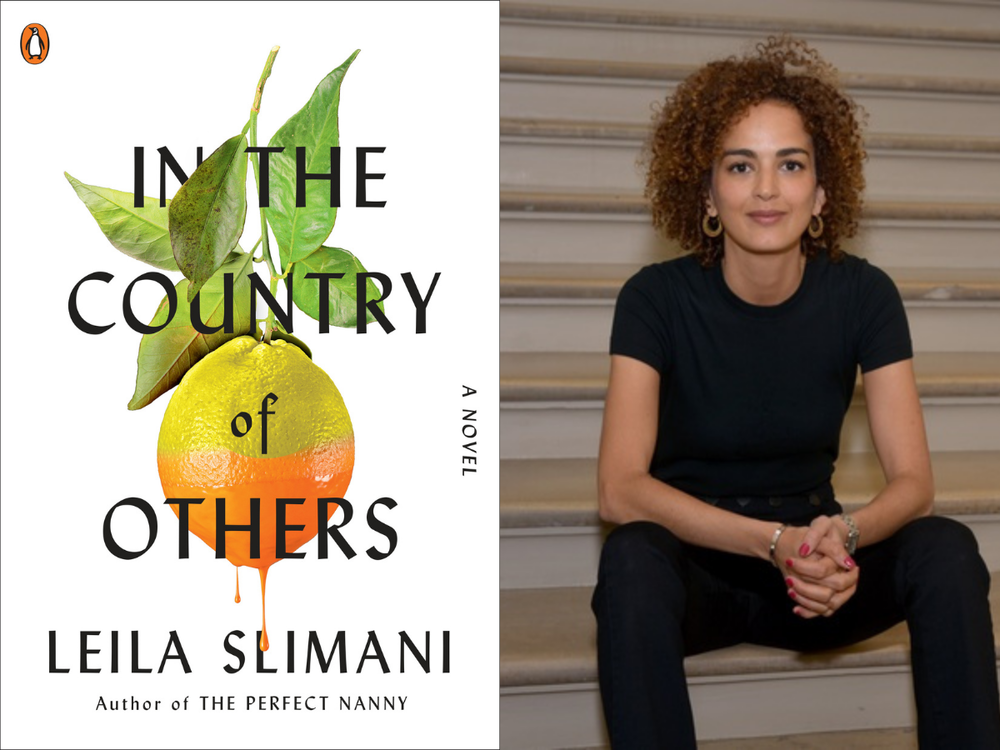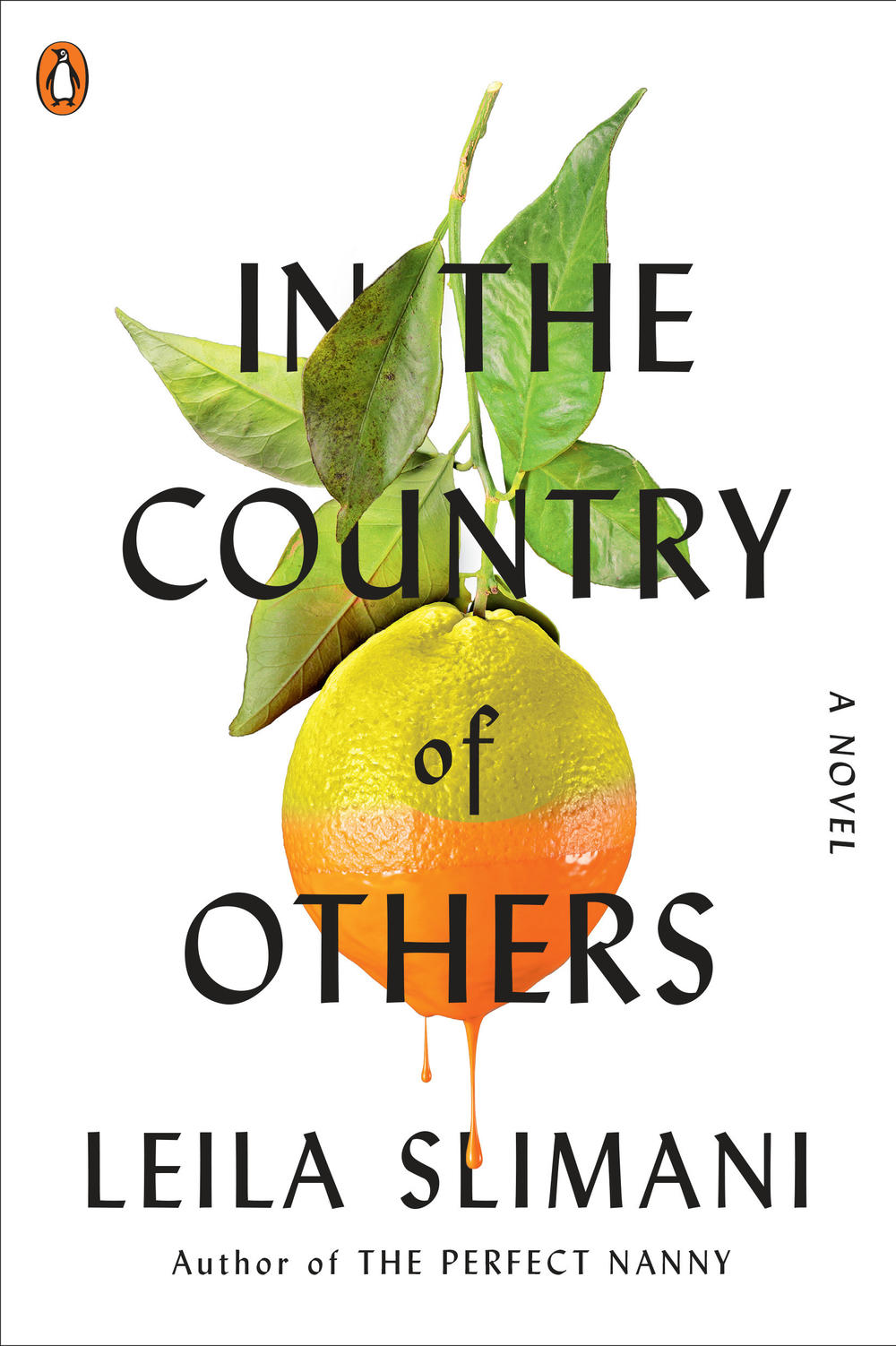Section Branding
Header Content
Walking Through "The Country Of Others"
Primary Content
The Code Switch team had so much fun talking about books and freedom this summer that we decided we're not going to stop. So from time to time, we'll be sharing conversations about books that helped us understand a different dimension of freedom. Up next: an interview with Leila Slimani, about her new book, In The Country of Others.
Leila Slimani is obsessed with so-called "others." The French Moroccan author and journalist says she sometimes wants to be like a little mouse, quietly getting to watch how other people "live, how they talk, how they fall in love."
Her new novel, In the Country of Others, follows that impulse: It's a study of how people behave when they're not amongst their own. The story takes place in Morocco in the 1940s and 1950s, during the fight for independence from France, and it follows a family made up largely of outsiders. Mathilde is a French woman living in a country where the language, culture, and landscape are all unfamiliar to her; her husband, Amine, is a Moroccan man trying to readjust to life as a civilian after fighting for France in World War II. Their oldest child, Aïcha, is a bit of an outsider as well; after an early childhood roaming her family's sprawling farm, she struggles to fit in with her well-mannered, confident (white) schoolmates.
The book is a portrait of both a country and a family trying to establish their identities in the midst of immense turmoil. So I spoke to Slimani about how she chose this particular place and time, and why freedom, for many of her characters, is a mixed blessing.
Our conversation has been edited and condensed for clarity.
The characters in In the Country of Others are trying to figure out their own identities at the same time that the country, Morocco, is trying to figure out its political and social identity. Why did you want to put these things in the same place?
I thought it would be interesting to draw a parallel between a country's fight for independence and the destiny of women. It's really fascinating and outraging to see that at that time, men — the nationalists, the bourgeoisie, the elite in Morocco — were fighting for more modernity, more emancipation. And they considered France a hypocrite country, because France was always talking about freedom, equality, fraternity, except when it came to Arab people.
And in a certain way, Moroccans did the same with women. They fought for independence and for freedom from France, forgetting all the time about women. And they considered freedom good enough for themselves but not for their daughters, their sisters and their wives. So I wanted to show the contradiction of Moroccan society at the time.
One of the things that we're always talking about on my team is the concept of freedom — how people are always fighting for freedom, but that freedom doesn't always look the way we expect. And it seems like that's the case for the characters in this book — they're fighting for things and then realizing that when they get them, they suddenly face a lot of new constraints. So what were you trying to convey about freedom in this book?
I'm obsessed with this question of freedom, and especially with the cost of freedom. For many women — and especially at that time, but it's still true today — it was very difficult to choose to be free, because to be free was also to be marginalized, to be an outcast, to be a pariah. I'm very surprised by readers, telling me, "I don't understand why Mathilde is staying with this man who is beating her. Why is someone accepting her situation?" But I want to tell them that, at the time, you didn't have so much choice, because choosing to be a divorcee or choosing to live without money for a woman who had no education — it was very difficult.
And I think that that's still the case. For instance, when I wrote Sex and Lies [a non-fiction book about gender roles in Morocco], I interviewed a lot of women. Some of them were single, lived alone and had jobs. And I said to them, "You must be happy to be a free woman, an independent woman." And a majority of them said, "if I had to redo it, I would not." Because this freedom is too expensive. The price is too high. And I would prefer to belong. I would prefer to have a place in society than to be free, but alone.
It's not easy to be free. A lot of people prefer security to freedom or comfort to freedom, or money to freedom. Choosing to be free is also choosing to make a lot of sacrifices.
Motherhood is a theme in a lot of your work and the kind of complications of what it means to be so attached to people, the sacrifices and the love that goes into it. Why is that a topic that's interesting to you?
I've always tried to explore the real life of women, women who are not heroes, who are not glamorous, who are not ideal women, but real women who spend a lot of time in the home, in the kitchen, with children doing trivial activities. I think that when I became a mother, it was the main source of inspiration to me as a writer, because I understood a lot about alienation of women through my own experience of motherhood. How guilty you can feel. The feeling that you can be a very bad mother, never be good enough. And also the fact that a lot of people want to trap you in this role, that you feel you have to sacrifice everything for that.
And I've always wanted to explore everything that goes with domesticity. For a very, very long time, writers used to think that domesticity was not interesting, not valuable. That you have to write novels about war, about men, about noble themes. But domestic themes are very political today. It's very important to open the door of the house and to go and explore what's happening behind the closed doors. Because the origin of violence, the origin of all domination, begins in the house. Domination towards children, towards women, towards domestic workers. And it's very important for me to explore that and try to understand the life of all those women who spent years and years in the kitchen cooking for the husband and cooking for the children. And I think it's too sad and too unfair to consider those women nothing — that their life is not valuable, that they didn't matter. I think they did matter, and that's why I want to write about them.
You also write a lot about childhood. The daughter in this book, Aïcha, is a very serious girl, she's kind of spiritual. How were you thinking about writing her?
I think she was, to me, the most interesting character. I love to write about children. She is a very wild child. First of all, because she's a child who was raised in nature and faraway from the city, and she has very few interactions with other people than her mother, her father and the people who live on the farm. So she knows nothing about the world. But she knows a lot about nature, animals, trees. And as a child myself who was raised in nature, in the farm of my grandparents, I know how strong the relationship is between a child and nature. She would speak to trees, she would speak to animals, and she feels that there is something beyond what you see. So I love that in her character.
I also love the fact that she doesn't understand the tension between her parents. She doesn't understand what's happening in terms of politics in the city and the country she lives in. But she understands that there is a problem, that there is tension, that there is a war somewhere. And there is a kind of violence inside her. Some compulsions that she expresses some time, like when she pricks a compass in the neck of a little girl in her classroom. And I love to write that, the idea of the child who is very serious and very wise and who obeys, and at the same time sometimes has this notion of violence.
She's also navigating being the daughter of a French woman and a Moroccan man, in a city where those two groups aren't usually intersecting, and it seems like there's not always a clear place for her?
I think that at the beginning, when she arrives in school, the first thing that shocks her is the fact that she doesn't even know her legal name. And she's so used to living in nature and spending time alone with her mother that it's very difficult for her to adapt to life in the group. And then she sees how people look at her, and she understands that there is something wrong with her look, with her clothes, with her hair, with the color of her skin. And that's something I wanted to stress in the book, is that the racism and discrimination is something very physical, something that you can feel in your flesh. When someone looks at you in the street and you know that he is looking at you like that because of your hair or because of your dark skin. I think that's something you can feel really physically. Racism is not a concept. It's not abstract. It's like someone punching you. It's like someone slapping you. You really feel it.
Copyright 2021 NPR. To see more, visit https://www.npr.org.



